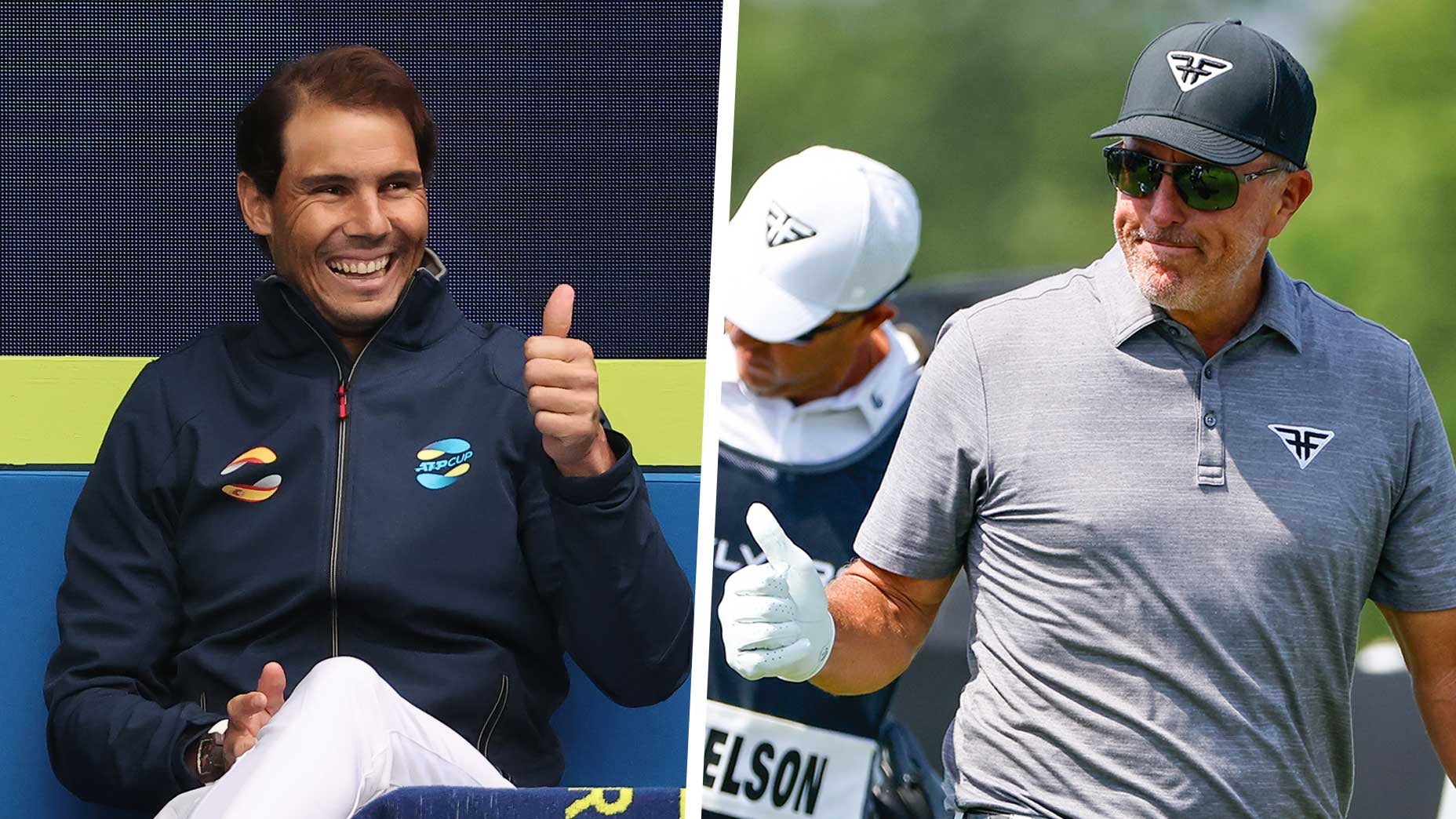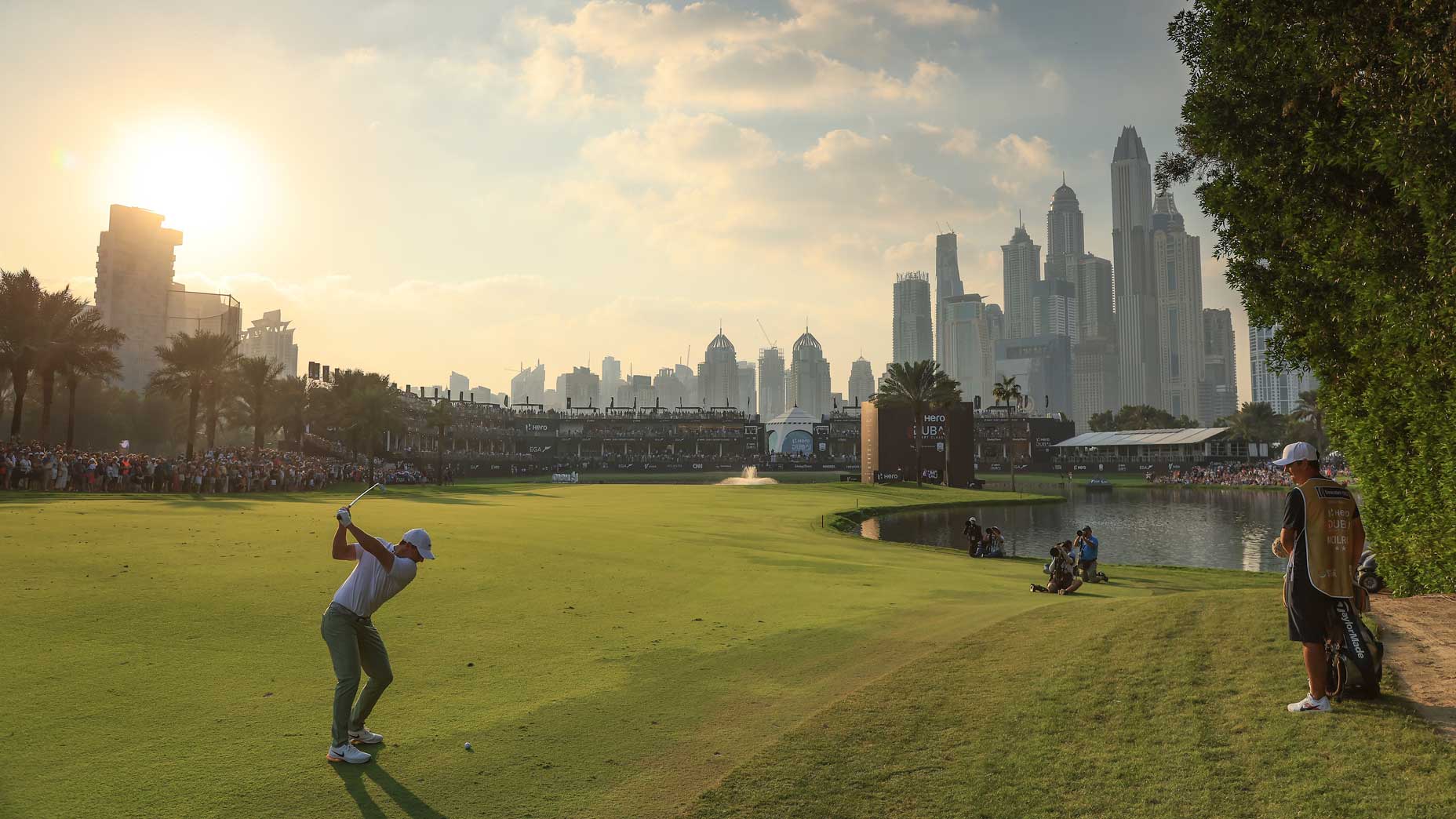
Rafael Nadal and Phil Mickelson have promised some of their future sporting endeavors will take place in Saudi Arabia.
Getty Images
Golf and tennis. Tennis and golf. Forever linked in their similarities. As complex as their pro tours — individuals surrounded by handlers plying their trade from city to city, focusing on four tournaments a year — and as simple as their glossaries. Backspin, slice, grip, sweet spot, ace.
This week, another commonality: investment from Saudi Arabia. Put another way, buying a foot in the door.
The ATP, the tennis equivalent of the PGA Tour, finally announced an official partnership with the Saudi PIF, the same entity that has been in negotiations with the Tour for most of the last year (and is the financial backer behind LIV Golf). The partnership had been loosely reported earlier in 2024, but is now confirmed as a 5-year deal worth a reported $100 million, according to tennis reporter and broadcaster Jon Wertheim. (As Jon aptly points out, that number pales in comparison to the money the PIF has invested in golf, but also could be indicative of more to come.)
The investment begins with naming rights to…the men’s ranking system. As tennis legend Andy Roddick said, “the Saudis bought math” — or the right to brand itself alongside the algorithm that ranks players. The PIF will also receive “court-side branding” at some of the tennis’ biggest events. Sure enough, just one day later, the BNP Paribas Open — tennis’ equivalent of the Players Championship — added a glowing 188-word explanation of the PIF as a “Premier Partner” on its website. This is all in addition to Jeddah hosting the final championship of the under-21 extension of the ATP through 2027.
While plenty of detail remains unknown about the nature of the partnership, one of Wertheim’s initial thoughts feels extremely accurate. He called the investment a “kindler, gentler” way of establishing a presence compared to the PIF’s launching of LIV Golf. LIV’s launch was, indeed, a lot less gentle. It has been largely viewed (and used) as a leverageable entity for players to earn significantly more money while playing less golf.
But that’s not to say there are no similarities between the PIF’s actions in tennis and golf. Fans of the club-and-ball sport should take note of what’s happening in the racket-and-ball sport, because there are plenty of clues of what a future PIF-PGA Tour deal could look like.
For starters, there have been rumors of the PIF organizing a tennis “Super League” that envelopes the biggest nine events in the sport in addition to the four grand slam events. While that remains a question mark — LIV Golf was once in similar organizational limbo — the idea seems to have enough interest that top players have spent portions of the last few years openly discussing profit-sharing, prize money, and their efforts at earning a greater share of it.
Sound familiar?
Something of the “super league” variety may seem unlikely in golf, especially since LIV Golf brokered a significant lawsuit that embroiled leaders from all four major championships. That move will not soon be forgotten. But Rory McIlroy does continue signifying his dream of a Champions League-like golf tour that sits above the pro golf world as we currently know it and ventures to far-reaching places where LIV Golf has found an audience — Singapore, Australia, Hong Kong … even Saudi Arabia. (An audience, for better or worse, can be simply hosting a tournament.)
The PIF has turned the money faucet on at large, and indications are its soccer properties will make another significant pursuit of some of the best footballers on the planet later this summer. Tennis is just the most recent example of Saudi sporting interest, as SRJ Sports Investments, a firm owned by the PIF, is reportedly getting closer to launching a new cycling tour. That same fund invested $100 million into the upstart Professional Fighters League, a rival of sorts to UFC. (All of those big-money moves came in SRJ’s first six months of existence.)
That seems to be a common page of the PIF’s sporting playbook — launching something new and slightly different, but very adjacent to the incumbent. A playbook that started, interestingly enough, with LIV Golf. Now it seems like just the first domino.
Investing in the PGA Tour’s new for-profit arm (PGA Tour Enterprises) would be different, of course. And for starters, any deal between the parties is receiving much more scrutiny from the American government’s antitrust regulators. But such an investment — likely in the realm of $2 to $3 billion — would stand to accomplish another of the Kingdom’s goals: bringing established sport to Saudi. Scheduling a LIV Golf event in Jeddah is one thing; getting the future PGA Tour schedule to guarantee a stop in King Abdullah Economic City is another. And, for whatever it’s worth, a Tour event in the Kingdom is exactly the kind of promise Tour players have discussed on driving ranges and in clubhouses since the June 6th Framework Agreement. Right now, the only men’s golf events hosted in Saudi Arabia are its own creations, while its Middle Eastern rivals in the United Arab Emirates continue to fund and host some of the most important events on the DP World Tour.
This tennis investment may be bite-sized, but it normalizes three important letters — P-I-F — on televisions screens at some of the biggest events in the world. Golf has seen a derivative of that with “Golf Saudi” apparel sponsorships and tournaments hosted by Aramco, Saudi’s $2 trillion petroleum company.
Therein lies a takeaway from the tennis deal. Many, many PIF-owned entities sponsor sporting events, Aramco chief among them. And there are many, many places where sponsorship is derived in golf. Could the OWGR take on a sponsor? Why not? The ATP Next-Gen Finals are “presented by NEOM,” a city being created out of thin air, in the same way that next week’s Arnold Palmer Invitational is “presented by Mastercard.” Coming to Riyadh this fall, a first-of-its-kind “6 Kings Slam” tennis event that pits Rafael Nadal — a newly-minuted ambassador of the Saudi Tennis Federation — against Novak Djokovic, Carlos Alcaraz and three other elite tennis stars in an exhibition series. On the line: multiple millions of dollars, everyone getting a check. On paper, it sounds a lot like the PGA Grand Slam of Golf, which ended in 2014 but was already guaranteeing $200,000 to the last-place performer.
Amid all these planned, rumored and potential partnerships is a commonality of discourse as well — questions about Saudi Arabia’s end goal(s) with these investments. There is plenty of resistance to the Middle Eastern nation throwing its money around, in turn sportswashing its reputation of authoritarianism. Tennis legends Chris Evert and Martina Navratilova recently spoke out against the idea of the Women’s Tennis Association signing a similar partnership with the Saudis, urging caution against taking money from a country whose record on human rights — and in particular women’s rights — has ranked among the worst worldwide.
The golf version of Evert and Navratilova may no longer exist, at least since June 6, when PGA Tour leadership determined a major section of the sport was up for sale. But with each new sporting investment the PIF makes, the next one seems all the more manageable. That might be exactly what the players of each sport desire, as it essentially guarantees a boost to their bank accounts without coming at the full cost of their reputations. But for those who oversee the governance of these sports, the Saudis have meant much choppier waters. Golf knows better than any.









